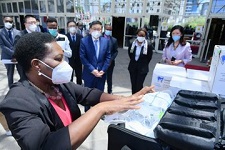African Ministers of Finance, Planning and Economic Development have unanimously called on the Economic Commission for Africa (ECA) and its development partners to spearhead and support efforts that are important for Africa’s economic growth to rebound in the aftermath of the COVID-19 pandemic.
In a statement adopted at the end of the 53rd session of the Economic Commission for Africa’s Conference of African Ministers of Finance, Planning and Economic Development, the ministers commended the ECA and its partners for providing African countries with a platform to discuss several debt initiatives, such as the Group of 20 Debt Service Suspension Initiative (DSSI) and sovereign debt restructuring, to enhance member States’ access to finance to effectively respond to the pandemic.
The ECA has been advocating for the extension of the DSSI to the end of 2021 at least, to ensure countries have enough liquidity to respond and kick-start recovery by freeing up resources to pay for much-need vaccines and improve their buffers. The liquidity and sustainability facility (LSF) is another important vehicle the ECA and its partners have been working on to assist African countries increase liquidity. The think tank has been a leading advocate for a new issuance and re-allocation of Special Drawing Rights (SDRs) to low- and middle-income countries.
“We express particular concern that the COVID-19 pandemic could heighten debt vulnerabilities of African least developed countries,” read the ministerial statement.
“Five of the six countries in debt distress are African least developed countries and two of the least developed countries have decided to seek debt restructuring under the common framework for debt treatments beyond the Debt Service Suspension Initiative of the Group of 20.”
“We underline the need to revisit the current system of support for the least developed countries in the lead-up to the Fifth United Nations Conference on the Least Developed Countries, in January 2022, with a view to ensuring that international support measures provide the levels of assistance necessary for the African least developed countries and Haiti to break down the structural barriers to advancement that they face and overcome their vulnerabilities.”
In the statement, the ministers recognized that, before the COVID-19 outbreak, Africa had made considerable progress towards social outcomes, with a reduction in poverty levels in most sub regions, but the pace of poverty reduction has been slow, with gross domestic product per capita growth of 0.5 per cent, lower than the previous two decades, and that this growth trajectory, which has currently been stalled or even reversed due to the pandemic, has not been inclusive, with low job creation.
They also recognize the role played by digital technologies in transforming industry through what is referred to as the fourth industrial revolution, which includes the adoption of technologies such as industrial robots and three-dimensional printing in manufacturing, and the use of big data and artificial intelligence in product development and e-commerce in marketing and sales, taking industrialization to an entirely new level.
During the two-day conference the ministers deliberated on the theme “Africa’s sustainable industrialization and diversification in the digital era in the context of COVID-19”, and considered that industrialization was arguably the only historically proven path to sustainable economic growth and development, underpinned by stronger industrialized economies, fostered by digitalization and diversification, and coupled with environmentally friendly policies and strategies.
“We take note of the opportunities that the COVID-19 pandemic has provided to strengthen polices and build forward better through an industrialization pathway that is environmentally sustainable and digitally empowered, which calls for policymakers to sow the seeds of a firm foundation for the digital era by strengthening research and development capabilities, mainstreaming science, technology and innovation in development policies, investing in Internet and digital infrastructure, and improving digital literacy skills and labour conditions,” said the ministers.
The African ministers acknowledged that, despite the pick-up in economic growth to 2.9 per cent in 2019, compared with 2.7 per cent in 2018, the coronavirus pandemic significantly affected African growth in 2020, with an estimated 5.4 per cent decline in gross domestic product growth rate, with adverse impact on social development, and induced severe challenges for African countries to achieve the sustainable development goals and goals of Agenda 2063.
“The pandemic has caused challenges and possible risks and uncertainties to the medium-term outlook, particularly as a result of low economic activity due to lockdowns to combat the pandemic, the threat from climate change, the global economic slowdown and the vulnerabilities exposed by COVID-19,” noted the ministers, adding that they were concerned with the trend towards deindustrialization due the pandemic.
The ministers recognized the importance of aligning industrial policies with other relevant sectoral policies, promoting local consumption and production, participation in regional and global value chains, and capitalizing on the benefits of the African Continental Free Trade Area to stimulate the industrialization of the continent.
Of importance, the ministers said, is an inclusive industrialization and economic diversification strategy that fosters the emergence of competitive micro, small and medium-sized enterprises and a well-linked informal sector.
“It is imperative for Africa to continue adopting evidence-based policymaking processes, with the aim of planning, designing, implementing, monitoring and evaluating sustainable and inclusive development policies that foster social cohesion through quality data within the frameworks of the 2030 Agenda for Sustainable Development and Agenda 2063,” said the ministers in their statement.

